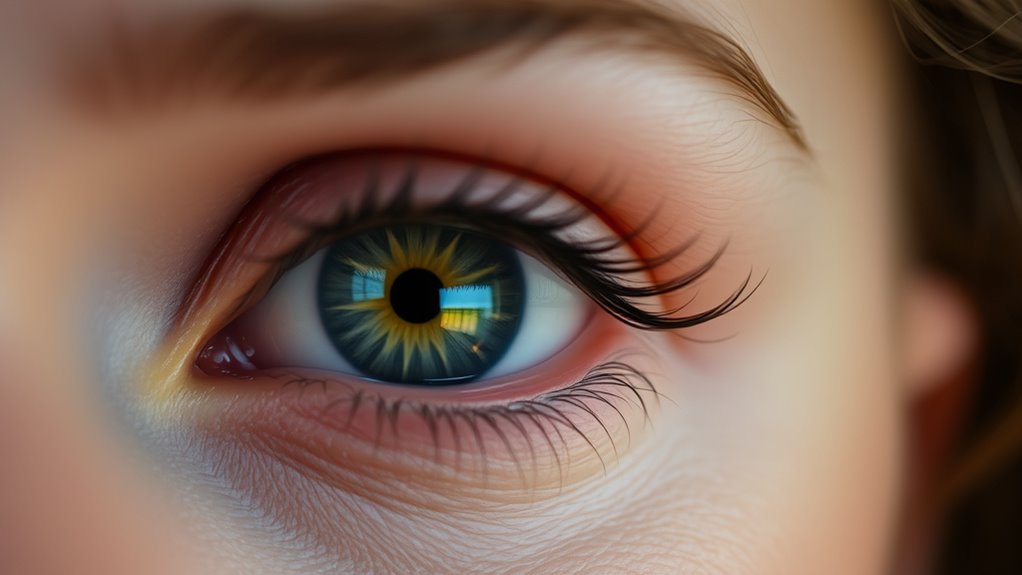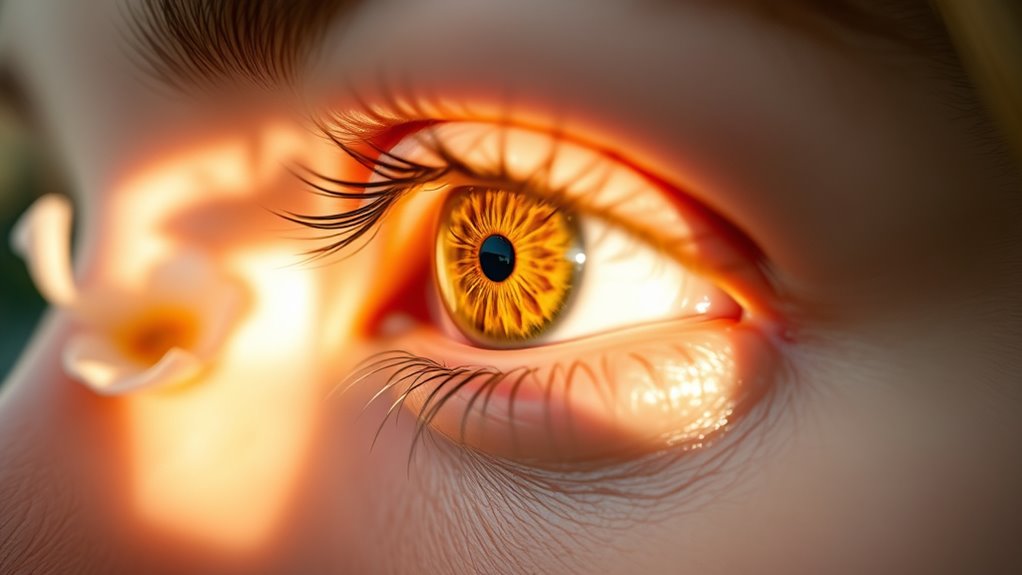During pregnancy, it’s normal to experience temporary vision changes like blurred vision, dry eyes, or puffy eyelids. Hormonal fluctuations can alter eye shape, possibly requiring a new prescription for glasses or contacts. While most changes are benign, keep track of any severe symptoms like sudden vision loss or light sensitivity, as these may indicate serious health issues. Staying informed about these changes can help you manage them effectively, and there’s more to discover about maintaining your eye health during this time.
Key Takeaways
- Hormonal fluctuations during pregnancy can cause temporary vision shifts and require new prescriptions for glasses or contacts.
- Puffy eyelids and fluid retention can obstruct peripheral vision but typically resolve after childbirth.
- Dry eyes may occur due to decreased tear production; using preservative-free artificial tears can help alleviate discomfort.
- Regular eye exams are crucial to monitor any vision changes and identify potential serious health conditions like preeclampsia.
- Most vision changes during pregnancy are normal, but significant symptoms should prompt immediate medical attention.

Have you noticed changes in your vision during pregnancy? It’s not uncommon for women to experience various vision shifts due to the hormonal fluctuations your body goes through. Most of these changes are temporary and should resolve after you give birth or finish breastfeeding.
However, it’s essential to monitor these changes, as some may indicate more serious health conditions like preeclampsia or gestational diabetes.
Monitoring vision changes during pregnancy is crucial, as some may signal serious health issues like preeclampsia or gestational diabetes.
One common issue is refractive changes. Hormones can alter the shape of your eyes, which might require a new prescription if you’re nearsighted, farsighted, or have astigmatism. While these changes aren’t typically a cause for concern, it’s wise to keep an eye on them with your eye doctor.
They’ll often recommend waiting until after delivery to reassess your prescription, although temporary corrective measures may be necessary if your current glasses or contacts aren’t doing the job.
You might also notice puffy eyelids, which can obstruct your peripheral vision. This puffiness is often due to hormonal changes and fluid retention. Keeping a balanced diet and staying hydrated can help manage this issue.
Reducing sodium and caffeine can also make a difference. Fortunately, this puffiness usually resolves after you’ve had your baby.
Dry eyes can be another frustrating symptom during pregnancy. Hormonal shifts can decrease your natural tear production, leading to a stinging or gritty feeling in your eyes. If you’re experiencing dry eyes, artificial tears can provide relief, but make sure to use preservative-free drops if you wear contact lenses.
In rare cases, this condition might persist even after pregnancy.
Blurred vision is another common complaint, often caused by fluid retention that thickens the cornea. This type of blurred vision is typically temporary, but if it interferes with your daily activities, temporary corrective measures may be necessary.
It’s best to avoid LASIK surgery or new contact lens fittings while pregnant.
Lastly, be vigilant about symptoms that could indicate serious conditions like preeclampsia or gestational diabetes. If you experience temporary vision loss, light sensitivity, or see flashing lights, seek medical attention right away.
Regular eye exams during your pregnancy can help monitor your vision health and ensure everything stays on track. Remember, most changes are normal, but staying informed is key!
Frequently Asked Questions
Can Pregnancy Cause Permanent Vision Changes After Childbirth?
Pregnancy can lead to temporary vision changes, but most of these resolve after childbirth.
It’s rare for these changes to become permanent. If you notice persistent vision issues postpartum, it’s essential to consult a healthcare professional.
Keeping track of your eye health during and after pregnancy is crucial.
Lifestyle choices, like a balanced diet and proper hydration, can support your vision and overall eye health during this time.
Are There Specific Eye Conditions to Watch for During Pregnancy?
When it comes to eye conditions during pregnancy, you’ve got to keep your eyes peeled.
Watch out for blurred vision, dry eyes, and changes in your vision prescription, as hormonal fluctuations can play tricks on your sight.
Conditions like gestational diabetes and pre-eclampsia are also crucial to monitor, as they can lead to serious issues.
Regular eye exams and immediate attention to concerning symptoms can help keep your vision in check.
Is It Safe to Wear Contact Lenses While Pregnant?
Yes, it’s generally safe to wear contact lenses during pregnancy, as long as you maintain proper hygiene.
Keeping your lenses clean can help prevent infections, which can be riskier during this time. However, be aware that hormonal changes might cause dryness or discomfort.
If you experience issues, consider switching to daily disposables or using lubricating drops. Always consult your eye doctor before making any changes to your contact lens routine during pregnancy.
How Does Pregnancy Affect Existing Eye Conditions?
Imagine waking up one morning and noticing your vision’s a bit off.
During pregnancy, existing eye conditions like myopia or hyperopia can worsen due to hormonal changes and fluid retention. You might experience blurred vision or altered refractive errors, but don’t worry—these changes are often temporary.
Regular check-ups will help you manage your eye health, ensuring you stay comfortable and informed throughout your pregnancy journey. Your vision will likely stabilize postpartum.
When Should I Consult an Eye Doctor During Pregnancy?
You should consult an eye doctor during pregnancy if you experience sudden or severe blurred vision, persistent eye pain, or any vision loss.
It’s crucial to seek help immediately if you notice light sensitivity or flashing lights, as these could indicate serious conditions.
Even if you don’t notice major changes, regular eye exams are essential for monitoring your eye health, especially if you have pre-existing conditions or gestational diabetes.
Stay proactive about your vision care.
Conclusion
As you journey through the beautiful landscape of pregnancy, remember that vision changes can be as common as morning sickness. Just like the shifting colors of a sunset, your eyesight may fluctuate, but most changes are temporary. Embrace this enchanting phase, knowing that your body is working hard to nurture new life. If you notice anything unusual, don’t hesitate to reach out to your doctor—after all, a clear vision of your health is worth its weight in gold.









